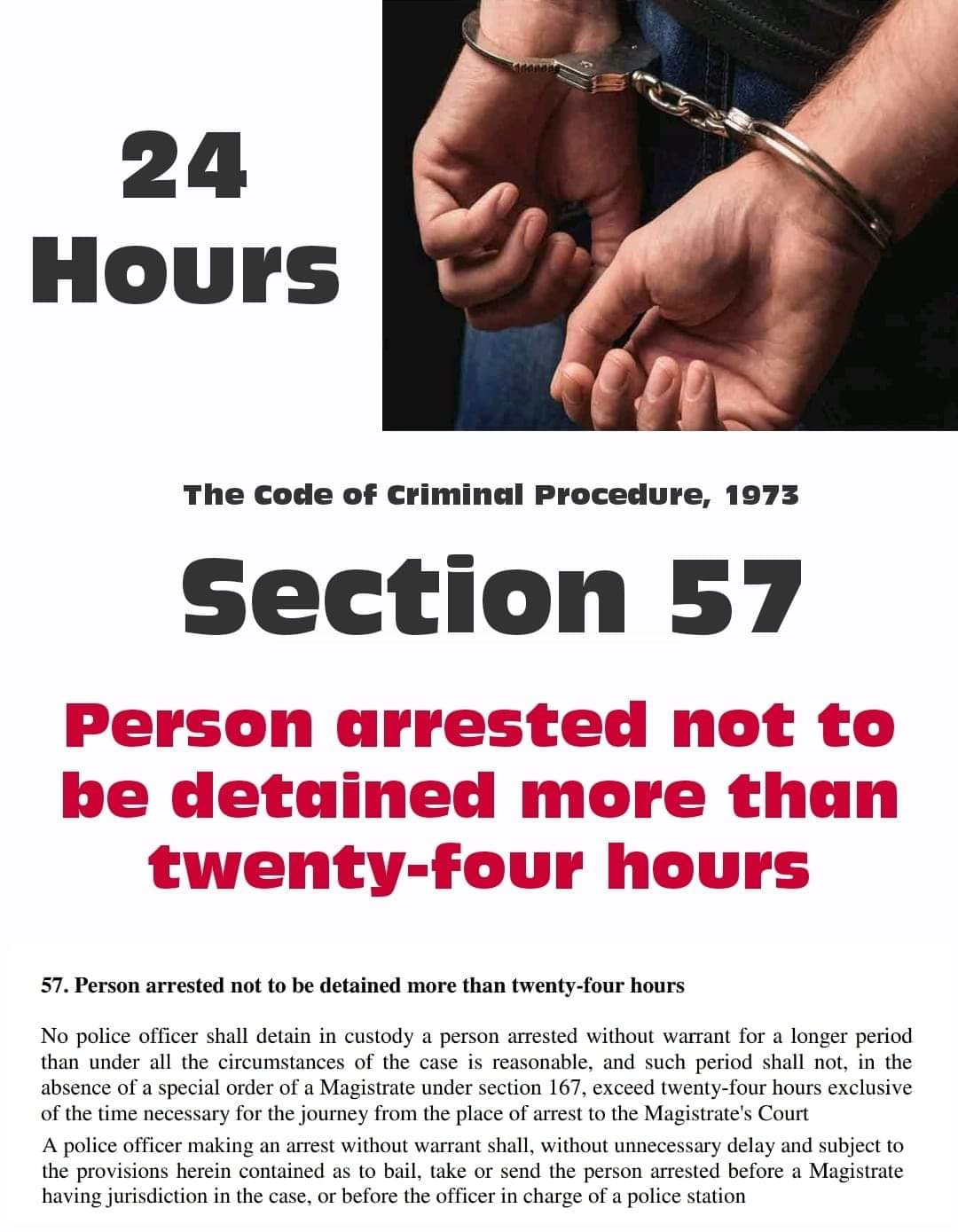Police Arrest? Without warrant? How long can they keep you in initial custody in India? What is the procedure after arrest in India?
Read Section 56 & 57 of
"THE CODE OF CRIMINAL PROCEDURE, 1973" to understand better.
Section 56: Person arrested to be taken before Magistrate or officer in charge of police station
A police officer making an arrest without warrant shall, without unnecessary delay and subject to the provisions herein contained as to bail, take or send the person arrested before a Magistrate having jurisdiction in the case, or before the officer in charge of a police station
Section 57: Person arrested not to be detained more than twenty-four hours
No police officer shall detain in custody a person arrested without warrant for a longer period than under all the circumstances of the case is reasonable, and such period shall not, in the absence of a special order of a Magistrate under section 167, exceed twenty-four hours exclusive
of the time necessary for the journey from the place of arrest to the Magistrate's Court.
***
There are two types of offences:
- Non-cognizable (Simple offence) (Mostly offence with less than 3 years of imprisonment) (Police can not arrest you without warrant of the magistrate)
- Cognizable (Serious offence) (mostly offence above 3 years of imprisonment) (Police can arrest you without warrant of the magistrate)
There are two sub-types of Cognizable Offences:
- Bailable (simple but Cognizable offence) (offence with less than 7 years imprisonment)
- Non-Bailable (serious offence) (offence with more than 7 years imprisonment)
If you have been arrested without warrent & taken to the police station for offences which are 'Bailable'. After your relative/friends or lawyer complete Bail Bond Formalities, Senior Police Inspector can release you at the Police Station itself. Also called as 'Station Bail' (subject to terms & conditions mentioned in the bail bond). Friends/Relatives signing bail bond for you are also known as 'Surities'.
If this Station Bail process can not be completed at the Police Station or Police officer do not give you bail at the Police station, the Bail application needs to be made to the district magistrate (where you will be taken within 24 hours of your arrest). Here, magistrate can not deny you a bail if it is a Bailable offence. Bail is an absolute right in case of Bailable offences and It can not be denied.
In case you have been arrested for 'Non-Bailable' (serious offences). Then, only district magistrate can take a call about your Bail; depending on the seriousness of the crime & initial information put forward to the magistrate by the Investigating officer.
If the nature of crime in Non-bailable case is very serious & if the investigating officer demands your custodial introgation, then, magistrate may send you for upto 15 days Police Custody.
After 15 days 'Police custody', if required, Investigating Police officer has to seek your 'Judicial Custody' from the magistrate (Prisoner in Trial).
In totality, before filing Chargesheet by Investigating officer your term in Jail ordered by magistrate (Police + Judicial Custody) can not exceed:
- 60 days (for offence which punishes with upto 10 years of Jail)
- 90 days (for offence which punishes with 10 to 14 years in jail)
- 180 days for UAPA, NDPS, etc Crimes (Terrorism related crimes) (for offence which punishes with life imprisonment or death)
If Investigating officer fails to file chargesheet within above number of days of your Jail term. Then, you will be eligible for 'Default Bail'.
But if Police officer files the chargesheet before that, then, after study of Chargesheet and depending upon the nature of crime, charges, information, witness, etc. Magistrate takes a call about your Bail.
Once Bail is given to you. You will be called in the court directly when the Trial starts. (Subject to terms & conditions of the Bail Bond).
I Hope this will give you basic idea about the arrest process. 🙏
For more details Read/Download PDF (226 pages)
THE CODE OF CRIMINAL PROCEDURE, 1973:
https://www.google.com/url?sa=t&source=web&rct=j&url=http://legislative.gov.in/sites/default/files/A1974-02.pdf&ved=2ahUKEwjpmaTyhOTqAhXCR30KHclnA4MQFjAZegQIARAB&usg=AOvVaw3LRC4k_lUXFf6ocJEf5KCt
CLASSIFICATION OF OFFENCES (THE FIRST SCHEDULE ) (Bailable & Non-bailable offence List)
https://www.google.com/url?sa=t&source=web&rct=j&url=https://districts.ecourts.gov.in/sites/default/files/classification.pdf&ved=2ahUKEwiE7JzFneTqAhXYWisKHQvFDuUQFjACegQIARAB&usg=AOvVaw0k14N_W2E3w9JWgOvUB8Ay&cshid=1595536871904
***
Disclaimer:
These guides are not legal advice, nor a substitute for a lawyer. These articles are provided freely as general guides for legal awareness in the Sociey. Laws are updated/amended regularly by concerned authorities. Please check for latest & updated laws with your legal advisor.
